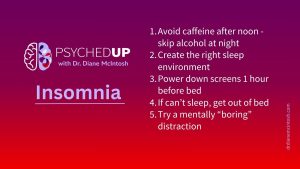
Struggling With Sleep? Here Are My Top Five Tips for Better Rest
I want to share my top five “sleep hygiene” habits that can support healthier sleep. They won’t solve chronic insomnia on their own, but they are essential ingredients for better rest.
Employers play an enormous part in supporting the mental health needs of their employees. Here are 7 things to consider while evaluating your programs and tools, and an overview of why supporting employee mental health is one of the most important things you can do.

After years of declining mental health, Jennifer’s psychologist suggested she ask for a leave from work. “I really like my job and I’ve never taken a health-related leave, but he told me a break might improve my depression.”
Jennifer was approved to take some time off on a short-term disability (STD) leave. While on leave, she tried to see her family doctor but she couldn’t get an appointment for several months. Jennifer had hoped to try another treatment, but felt her issues were too complicated for a walk-in clinic.
“What I’m taking obviously isn’t working, “ she shared.
After 3 months of leave, she was deemed able to return to work, which she did, only to go on leave again six months later, because her depression was “worse than ever.”
This fictional story is typical of so many people who continue to work while struggling with their mental health and highlights the importance of timely access to appropriate mental healthcare.
Mental illness is associated with more lost work days than any other chronic condition, with an estimated 500,000 Canadians missing work every week, costing our economy more than $50 billion annually in lost productivity.
According to Sun Life, mental health-related claims rose more than 70% between 2019 and 2023. Up to 40% of all short term disability claims are due to mental illness, accounting for nearly half of all short term disability costs.
The vast majority of people on leave for mental illness do not want to take leave. They’d like to be well and at work.
When you’re on medical leave, your healthcare provider (if you have one) is expected to work with you to develop a treatment plan and support your return to work. We know mental illnesses are challenging to diagnose and treat, so Jennifer could be one of the more than 60% of people who are misdiagnosed or under-treated.
The best possible outcome for Jennifer and her employer would be for her to return to work successfully, meaning she’s well and her illness doesn’t recur so she doesn’t require additional leaves or, in the worst case, a long term disability leave.
The best possible investment for employers is to ensure their employees have timely access to evidence-based mental healthcare, as early as possible.
Canadians already have limited access to timely, evidence-based mental healthcare, so many large organizations have taken this on, offering benefits such as healthcare spending accounts and coverage for psychological counselling services.
Innovative leaders have driven those changes by embracing the proven axiom, “If you take care of your employees, they’ll take care of your business.”
Incredibly, 77% of surveyed employees said they would consider changing jobs and 60% said they would accept less money if a prospective employer offered better support for mental health and wellbeing.
Regrettably, many smaller employers are unable to compete with larger organizations that can offer comprehensive programs, making it more difficult for them to recruit and retain top talent.
The good news is that employers can take immediate action to support individual team member’s health without waiting for the healthcare system to catch up. Here are my suggestions:
I look forward to hearing how some of these ideas work for you. Send me your thoughts on my Contact form or through LinkedIn.
Dr. Diane McIntosh is a psychiatrist, innovator, educator, author and speaker. She is a passionate advocate for better mental health care, and a champion for all who suffer from mental health challenges.
For more on how leaders can improve mental health practices at work, see WickedMind episodes with Louise Bradley (Past President Mental Health Commission of Canada) and Stéphane Grenier (Founder, Mental Health Innovations Consulting).
This blog post is part of a series looking at the state of our mental healthcare system and ways we can create sustainable change to improve quality and outcomes for anyone impacted by mental illness.

I want to share my top five “sleep hygiene” habits that can support healthier sleep. They won’t solve chronic insomnia on their own, but they are essential ingredients for better rest.

There’s something about flipping the page on the calendar from December to January. For many of us, the beginning of a new year represents a clean slate. So, if you find yourself in the mood to take that time to pause and reflect after the holidays, here are a few tips on making smart New Year’s resolutions.

The holidays can be stressful. Here are a few thoughts on how to make the most of what can be a most wonderful time of the year.
Dr. Diane McIntosh is a psychiatrist, innovator, educator, author, and speaker. She is passionate advocate for better mental health care, and a champion for all who suffer from mental health challenges.
Please provide your contact information in the form below. It helps if you provide enough detail in your message so we can help. We look forward to hearing from you!
Thank you for your message. We will respond to your email promptly.